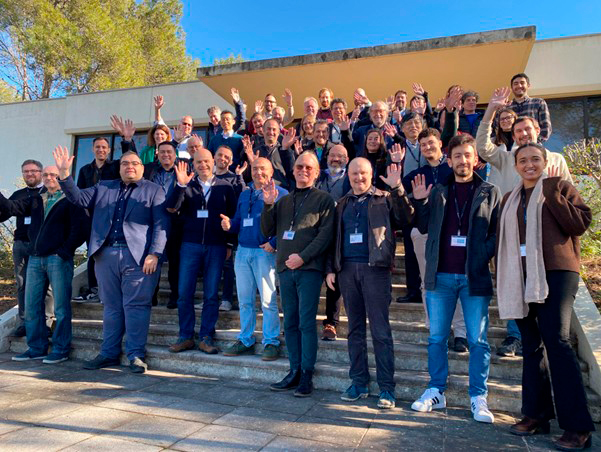by Dave Raggett, Rigo Wenning (ERCIM/W3C) and Peter Kunz (ERCIM)
ERCIM hosted the AIOTI (Alliance for AI, IoT and Edge Continuum Innovation) Workshop on Semantic Interoperability for Digital Twins in Sophia Antipolis, France, on 5–6 February 2025. The workshop brought together around 50 experts in the field of semantic interoperability, who enjoyed a packed two-day programme featuring 13 keynotes and 15 long and short talks, with ample space for engaging discussions.

Group photo taken in the sunshine on the first day.
The main goal of the workshop was to advance semantic interoperability to support industrial and commercial applications, specifically leveraging digital twin technology. Semantic interoperability allows computer systems to exchange data with clearly defined and shared meaning, which is critical for seamless integration across multiple domains, supporting initiatives like the EU's Green Deal and circular economy.
Key discussions centred around practical solutions to industrial challenges, the effective reuse of semantic technologies, and the importance of controlled vocabularies, taxonomies, and ontologies. Special emphasis was placed on the role of Digital Twins, virtual replicas of physical entities that support prediction, simulation, and automation capabilities.
Highlights from Day 1 included Martin Bauer (NEC Laboratories Europe) presenting on the AIOTI ontology landscape, emphasizing the reuse and quality assessment of ontologies. Cornelis Bouter (TNO) introduced a forthcoming whitepaper on data-to-ontology mapping, presenting various tools categorised into graphical interfaces, configuration languages, and programming languages, each evaluated for usability, scalability, and expressivity.
Keynote presentations addressed challenges associated with semantic interoperability, notably Vladimir Alexiev (Fraunhofer IWU) discussing the use of Asset Administration Shell (AAS) and ECLASS standards in industrial digital twins, highlighting significant challenges in RDF representation and semantic consistency. Sebastian Käbisch (Siemens) discussed the integration of Web of Things (WoT) standards within the AAS framework, aiming to standardise asset interface descriptions. Darko Anicic (Siemens) stressed the importance of standardised semantics for interoperability in automation systems.
The second day focused on generative AI's role in semantic interoperability, vocabulary development best practices, and the tooling needed for vocabulary management and ontology discovery. Martin Bauer (NEC Laboratories Europe) discussed leveraging generative AI for ontology mapping, highlighting ongoing research into the accuracy and practicality of such applications. Best practices were exemplified through the SAREF suite of ontologies presented by Cornelis Bouter (TNO) and GS1’s approach to vocabulary management, emphasizing governance and community involvement by Phil Archer (GS1).
Tooling for vocabulary development received attention, with demonstrations of platforms like OntoPortal presented by Naouel Karam (InfAI) and SEMAPTIC introduced by Carlos Pereira (INESC-TEC), showcasing user-friendly interfaces designed to streamline ontology discovery and application. The event concluded with recommendations emphasizing continued collaboration between industry stakeholders, researchers, and standardisation bodies, underscoring the necessity of user-friendly tools, accurate semantic models, and comprehensive governance for sustainable progress in semantic interoperability.
The workshop called for ongoing dialogue and practical collaboration to address key gaps, especially in data mapping, ontology alignment, and the practical deployment of semantic technologies across diverse industrial domains.
Most of the presentations from the workshop are available on the workshop webpage [L2]. A detailed report, including recommendations, will be published on the ERCIM website [L3]. The workshop chairs would like to thank the program committee and all participants for their contributions to making this event successful. They also express their gratitude to Inria for providing the meeting facilities, and to the EU projects Nephele [L4] and SmartEdge [L5] for their support.
Links:
[L1] https://aioti.eu/
[L2] https://www.ercim.eu/events/aioti-workshop-on-semantic-interoperability-for-digital-twins
[L2] https://www.ercim.eu/publications/strategic-reports
[L3] https://nephele-project.eu/
[L4] https://www.smart-edge.eu/
Please contact:
Dave Raggett, ERCIM/W3C











